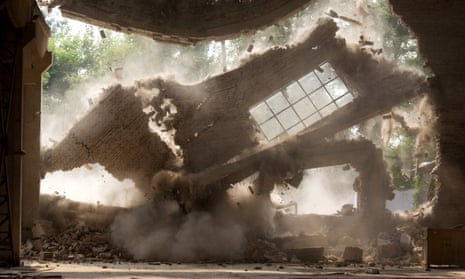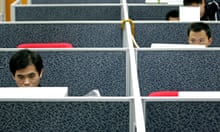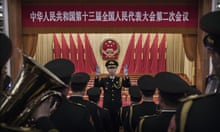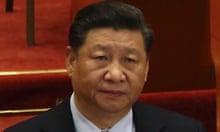Chinese authorities are razing a Beijing studio of dissident artist Ai Weiwei, as his team race to remove years’ worth of his sculptures.
“Farewell,” Ai wrote on Instagram, below footage of an excavator clawing at a hole in the concrete wall, as workers boxed artwork in the cavernous hall.
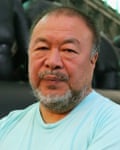
“They started to demolish my studio ‘Zuoyou’ in Beijing with no precaution,” he wrote in English.
He posted a series of other images of the studio, a former car parts factory in Beijing’s outer suburbs.
Some images showed it being dismantled, others showed it filled with monumental works from exhibitions held in calmer days.
Ai helped to design the much-admired “Bird’s Nest” stadium that was at the heart of the 2008 Beijing Olympic Games and was used as its symbol.
This article includes content provided by Instagram. We ask for your permission before anything is loaded, as they may be using cookies and other technologies. To view this content, click 'Allow and continue'.
However, even before the Games opened he had become increasingly critical of the authorities, particularly after a devastating earthquake in eastern Sichuan province just ahead of the Olympics.
Thousands of children were buried under schools that collapsed, and Ai became an advocate for the dead and their families, compiling names of students entombed in their schools, and later creating works to honour them.
In 2011, he was detained by the Chinese government for 81 days and after his release was accused of company tax evasion, charges that he said were politically motivated.
He paid a $2.4m (£1.5m) fine partly with donations from supporters, but his passport was confiscated for several years, preventing him from travelling. It was only returned in 2015, and since then, he has lived in self-imposed exile in Berlin.
This article includes content provided by Instagram. We ask for your permission before anything is loaded, as they may be using cookies and other technologies. To view this content, click 'Allow and continue'.
Ai had been expecting to leave the studio soon, his assistant Ga Rang told AFP, because the rental contract on the space had expired last autumn.
However, Ga said, it had not been possible to remove all the artwork stored in the space because there was so much of it, and the sudden destruction put some of it at risk. “They came and started knocking down the windows today without telling us beforehand. There’s still so much stuff inside.”
It was not clear if the destruction was targeting Ai directly. Chinese authorities have been clearing swathes of suburban Beijing over the last year, and residents near the studio said the former factory area was slated for redevelopment, AFP reported.
